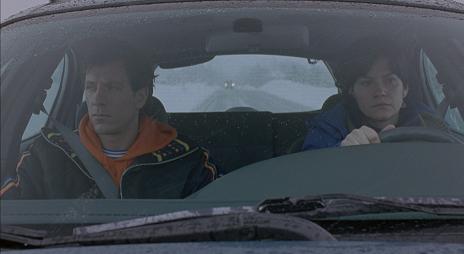“J’arrive du futur.”
After premiering at the Berlinale, Stéphane Lafleur‘s sophomore effort had the honor of opening the Rendez-vous du cinéma québécois, the big annual fest of made-in-Quebec film. I wasn’t a big fan of Lafleur’s debut, the Jutra-winning borefest “Continental, un film sans fusil”, though I did find it nicely shot, well acted and not uninteresting conceptually. Incidentally, I also happen to love Lafleur’s band Avec pas d’casque, where his particular sensibility and sense of whimsy are best served in my opinion.
In any case, I walked into “En terrains connus” hoping it would work better for me than “Continental” and guess what: it did. While it still deals with boring people, played by actors who deliver intentionally flat performances, the movie itself is more involving this time, thanks to more (deadpan) humor, more (understated) drama and a more pronounced (if still muted) surreal feel.
Francis La Haye stars as Benoit, a man in arrested development who still lives with his widowed father (Michel Daigle). One day in January or February, a Man from the Future (Denis Houle) -well, from next September anyway- comes to him with foreboding news: his sister Maryse (Fanny Mallette), who’s struggling with an unfulfilling marriage to Alain (Sylvain Marcel), will soon die during a road trip. But instead of trying to save her, Benoit decides to ride along with her…
That’s pretty much it as far as plot goes in “En terrains connus”, but in the way things unfold and the general tone, it reminded me a bit of something like “Donnie Darko” or even “Stalker”. Artsy, existential sci-fi, if you will. I was quite taken by the long static tableaux crafted by Lafleur, cinematographer Sarah Mishara and art director André-Line Beauparlant, in which bits of bright color contrast with the white winter backdrop: Benoit’s orange helmet and hoodie, Maryse’s blue coat, yellow ski-doo and excavator, a green potted plant, etc.

There’s a slightly unsettling quality to the film that comes from the ominous title cards (“Accident #1”, “Accident #2”, “Accident #3”), the slow zoom-ins of the camera, the peculiar sound design and especially the minimalist, hypnotic synth-heavy score by Swedish instrumental band Sagor & Swing
Ultimately, “En terrains connus” remains a bit thin, neither delivering great thrills, laughs and emotion nor saying anything particularly profound about its themes (loneliness, alienation and seasonal depression, ostensibly), but little by little, it draws us in nonetheless. If only as an exercise in style, it’s more successful than “Continental, un film sans fusil” as far as I’m concerned.
